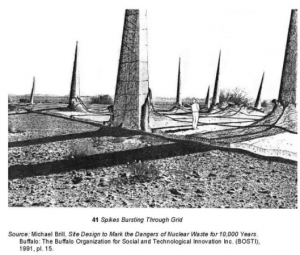Wednesday, May 09, 2018
4:00-6:00 PM
Louden Nelson Center, Room 1
301 Center St, Santa Cruz, CA 95060

Source: Michael Brill, Site Design to Mark the Dangers of Nuclear Waste for 10,000 Years. Buffalo: The Buffalo Organization for Social and Technological Innovation Inc. (BOSTI). 1991, pl 15.
Writers and activists researching nuclear things face “the challenge of rendering visible occluded, sprawling webs of interconnectedness” (Nixon 2011, 13). This discussion features two writers whose work traces the sprawling webs of nuclear geographies, binding uranium mining and its dispersed radioactive legacies. Julie Salverson (Professor of Drama and Cultural Studies, Queen’s University) links the mines of Northern Canada with the U.S.’s use of nuclear weapons in Japan, and the later disaster at Fukushima, while Gabrielle Hecht (Professor of History and Nuclear Security, Stanford) examines the afterlives of neocolonial uranium mining by French companies in Gabon. Salverson and Hecht experiment with different conceptual and writerly methods to trace the geographies of these extractive economies and their uneven effects.
This discussion with Salverson and Hecht is moderated by UCSC’s Science and Justice Research Center. We invite event attendees to read a representative article from each author, email Lindsey Dillon at lidillon@ucsc.edu for a copy of the readings.
- Salverson, Julie and Peter C. van Wyck. “Through the Lens of Fukushima.” Forthcoming in Through Post Atomic Eyes, edited by Claudette Lauzon and John O’Brian. McGill-Queen’s University Press.
- Hecht, Gabrielle. “Interscalar Vehicles for an African Anthropocene: On Waste, Temporality, and Violence.” Cultural Anthropology 33, no. 1 (2018): 109-141.
References
Nixon, Rob. Slow Violence and the Environmentalism of the Poor. Harvard University Press, 2011.
